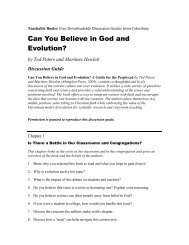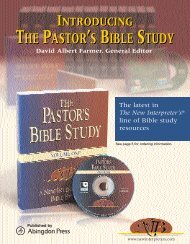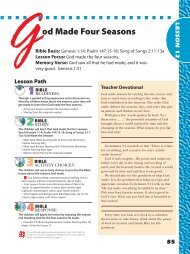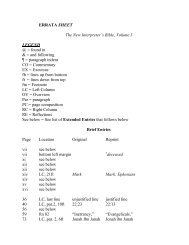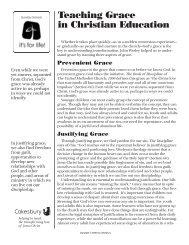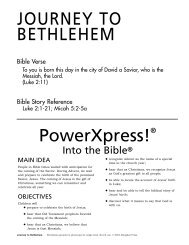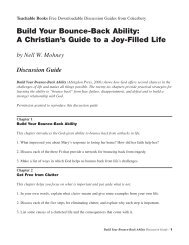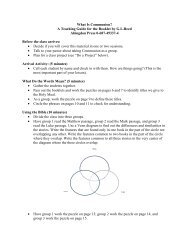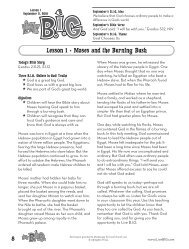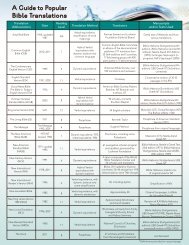- Page 2 and 3:
Yearbook of American & Canadian Chu
- Page 4 and 5:
Seventy-eighth Issue Annual YEARBOO
- Page 6:
Contents Editor’s Preface . . . .
- Page 9 and 10:
includes an original survey of 34 c
- Page 11 and 12:
TRENDS & DEVELOPMENTS, 2009 a discr
- Page 13 and 14:
TRENDS & DEVELOPMENTS, 2009 Table 2
- Page 15 and 16:
Table 3 PATTERNS OF U.S. MEMBERSHIP
- Page 17 and 18:
The New Immigrant Church Rev. Eilee
- Page 19 and 20:
1. The potential changes to the Ame
- Page 21 and 22:
US COOPERATIVE ORGANIZATIONS Senior
- Page 23 and 24:
US COOPERATIVE ORGANIZATIONS Headqu
- Page 25 and 26:
US COOPERATIVE ORGANIZATIONS Immedi
- Page 27 and 28:
US COOPERATIVE ORGANIZATIONS Chapla
- Page 29 and 30:
US COOPERATIVE ORGANIZATIONS Church
- Page 31 and 32:
US COOPERATIVE ORGANIZATIONS Africa
- Page 33 and 34:
US COOPERATIVE ORGANIZATIONS Presby
- Page 35 and 36:
US COOPERATIVE ORGANIZATIONS The Lo
- Page 37 and 38:
US COOPERATIVE ORGANIZATIONS Headqu
- Page 39 and 40:
US COOPERATIVE ORGANIZATIONS divers
- Page 41 and 42:
US COOPERATIVE ORGANIZATIONS Media
- Page 43 and 44:
US COOPERATIVE ORGANIZATIONS regist
- Page 45 and 46:
US COOPERATIVE ORGANIZATIONS vision
- Page 47 and 48:
US COOPERATIVE ORGANIZATIONS Church
- Page 49 and 50:
2. Canadian Cooperative Organizatio
- Page 51 and 52:
CANADIAN COOPERATIVE ORGANIZATIONS
- Page 53 and 54:
CANADIAN COOPERATIVE ORGANIZATIONS
- Page 55 and 56:
CANADIAN COOPERATIVE ORGANIZATIONS
- Page 57 and 58:
US RELIGIOUS BODIES 3. Religious Bo
- Page 59 and 60:
US RELIGIOUS BODIES James E. McCoy,
- Page 61 and 62:
US RELIGIOUS BODIES Editor, Women
- Page 63 and 64:
US RELIGIOUS BODIES Publications, E
- Page 65 and 66:
US RELIGIOUS BODIES East Region, Ja
- Page 67 and 68:
US RELIGIOUS BODIES Brooklyn’s Sa
- Page 69 and 70:
US RELIGIOUS BODIES Apostolic Chris
- Page 71 and 72:
US RELIGIOUS BODIES incorporated in
- Page 73 and 74:
US RELIGIOUS BODIES Assemblies of G
- Page 75 and 76:
US RELIGIOUS BODIES unity of all be
- Page 77 and 78:
US RELIGIOUS BODIES Headquarters 20
- Page 79 and 80:
US RELIGIOUS BODIES The church is T
- Page 81 and 82:
US RELIGIOUS BODIES the area during
- Page 83 and 84:
US RELIGIOUS BODIES Officers (Co-Mi
- Page 85 and 86:
US RELIGIOUS BODIES Idaho, South, R
- Page 87 and 88:
US RELIGIOUS BODIES Episcopal Churc
- Page 89 and 90:
US RELIGIOUS BODIES Christian Refor
- Page 91 and 92:
US RELIGIOUS BODIES Southeastern Di
- Page 93 and 94:
US RELIGIOUS BODIES Church of God (
- Page 95 and 96:
US RELIGIOUS BODIES Bible, includin
- Page 97 and 98:
US RELIGIOUS BODIES Church of God,
- Page 99 and 100:
US RELIGIOUS BODIES AUXILIARY ORGAN
- Page 101 and 102:
US RELIGIOUS BODIES Officers Gen. S
- Page 103 and 104:
US RELIGIOUS BODIES DEPARTMENTS Cro
- Page 105 and 106:
US RELIGIOUS BODIES Samuel McAdow,
- Page 107 and 108:
US RELIGIOUS BODIES Exec. Dir., Off
- Page 109 and 110:
US RELIGIOUS BODIES The Rt. Rev. Cr
- Page 111 and 112:
US RELIGIOUS BODIES Periodicals Win
- Page 113 and 114:
US RELIGIOUS BODIES The church is d
- Page 115 and 116:
US RELIGIOUS BODIES Southeastern Pe
- Page 117 and 118:
US RELIGIOUS BODIES faith in the de
- Page 119 and 120:
US RELIGIOUS BODIES Headquarters Wo
- Page 121 and 122:
US RELIGIOUS BODIES Lugari Yearly M
- Page 123 and 124:
US RELIGIOUS BODIES Oakland City Un
- Page 125 and 126:
US RELIGIOUS BODIES His Eminence Me
- Page 127 and 128:
US RELIGIOUS BODIES Headquarters Me
- Page 129 and 130:
US RELIGIOUS BODIES evangelizing th
- Page 131 and 132:
US RELIGIOUS BODIES Headquarters Pr
- Page 133 and 134:
US RELIGIOUS BODIES Synods. The lit
- Page 135 and 136:
US RELIGIOUS BODIES Officers Pres.,
- Page 137 and 138:
US RELIGIOUS BODIES has been engage
- Page 139 and 140:
US RELIGIOUS BODIES Periodicals The
- Page 141 and 142:
US RELIGIOUS BODIES Headquarters P.
- Page 143 and 144:
US RELIGIOUS BODIES Officers Gen. T
- Page 145 and 146:
US RELIGIOUS BODIES Christian Educa
- Page 147 and 148:
US RELIGIOUS BODIES federation with
- Page 149 and 150:
US RELIGIOUS BODIES the Reformed he
- Page 151 and 152:
US RELIGIOUS BODIES Officers Bishop
- Page 153 and 154:
US RELIGIOUS BODIES emphasizes bein
- Page 155 and 156:
US RELIGIOUS BODIES Headquarters 12
- Page 157 and 158:
US RELIGIOUS BODIES Michigan, Micha
- Page 159 and 160:
US RELIGIOUS BODIES Memory became t
- Page 161 and 162:
US RELIGIOUS BODIES of unity by a r
- Page 163 and 164:
US RELIGIOUS BODIES gations in the
- Page 165 and 166:
US RELIGIOUS BODIES Wider Church Mi
- Page 167 and 168:
US RELIGIOUS BODIES West Virginia D
- Page 169 and 170:
US RELIGIOUS BODIES Birmingham Epis
- Page 171 and 172:
US RELIGIOUS BODIES Headquarters 40
- Page 173 and 174:
US RELIGIOUS BODIES Officers GENERA
- Page 175 and 176:
US RELIGIOUS BODIES Religious Bodie
- Page 177 and 178: US RELIGIOUS BODIES National Associ
- Page 179 and 180: CANADIAN RELIGIOUS BODIES Central N
- Page 181 and 182: CANADIAN RELIGIOUS BODIES matters o
- Page 183 and 184: CANADIAN RELIGIOUS BODIES Canadian
- Page 185 and 186: CANADIAN RELIGIOUS BODIES CORRESPON
- Page 187 and 188: CANADIAN RELIGIOUS BODIES The first
- Page 189 and 190: CANADIAN RELIGIOUS BODIES Headquart
- Page 191 and 192: CANADIAN RELIGIOUS BODIES Apostle i
- Page 193 and 194: CANADIAN RELIGIOUS BODIES upon conf
- Page 195 and 196: CANADIAN RELIGIOUS BODIES General C
- Page 197 and 198: CANADIAN RELIGIOUS BODIES Mennonite
- Page 199 and 200: CANADIAN RELIGIOUS BODIES The Pente
- Page 201 and 202: CANADIAN RELIGIOUS BODIES Media Con
- Page 203 and 204: CANADIAN RELIGIOUS BODIES The Salva
- Page 205 and 206: CANADIAN RELIGIOUS BODIES leaders,
- Page 207 and 208: CANADIAN RELIGIOUS BODIES and Centr
- Page 209 and 210: CANADIAN RELIGIOUS BODIES The Evang
- Page 211 and 212: Periodicals The Journal of the Amer
- Page 213 and 214: Current or Recent Research The Barn
- Page 215 and 216: Current or Recent Research Some of
- Page 217 and 218: distinguished author of publication
- Page 219 and 220: SOURCES II. Directory of Selected F
- Page 221 and 222: Email: bcahq@pacbell.net Website: b
- Page 223 and 224: Hindus agree for the most part on n
- Page 225 and 226: Muslim American Society 6408 Edsal
- Page 227: Jewish Council for Public Affairs 1
- Page 231 and 232: 6. United States Regional and Local
- Page 233 and 234: US ECUMENICAL BODIES Major Activiti
- Page 235 and 236: US ECUMENICAL BODIES Exec. Dir., Pa
- Page 237 and 238: US ECUMENICAL BODIES Clustering; De
- Page 239 and 240: US ECUMENICAL BODIES Violence-Ecume
- Page 241 and 242: US ECUMENICAL BODIES Major Activiti
- Page 243 and 244: US ECUMENICAL BODIES Website: www.m
- Page 245 and 246: US ECUMENICAL BODIES Website: www.b
- Page 247 and 248: US ECUMENICAL BODIES congregations
- Page 249 and 250: US ECUMENICAL BODIES Email: churche
- Page 251 and 252: US ECUMENICAL BODIES Easter Dawn Se
- Page 253 and 254: US ECUMENICAL BODIES STAFF: Coordin
- Page 255 and 256: US ECUMENICAL BODIES Treas., Ms. Sh
- Page 257 and 258: US ECUMENICAL BODIES Northeast Emer
- Page 259 and 260: US ECUMENICAL BODIES Exec. Dir., Re
- Page 261 and 262: US ECUMENICAL BODIES Treas., George
- Page 263 and 264: US ECUMENICAL BODIES San Antonio Co
- Page 265 and 266: US ECUMENICAL BODIES Exec. Dir., Ja
- Page 267 and 268: INDEX OF SELECT PROGRAMS Index of S
- Page 269 and 270: INDEX OF SELECT PROGRAMS Troy Area
- Page 271 and 272: INDEX OF SELECT PROGRAMS Mahoning V
- Page 273 and 274: INDEX OF SELECT PROGRAMS Metropolit
- Page 275 and 276: INDEX OF SELECT PROGRAMS Georgia Ch
- Page 277 and 278: INDEX OF SELECT PROGRAMS Hanover Ar
- Page 279 and 280:
INDEX OF SELECT PROGRAMS Tuscarawas
- Page 281 and 282:
INDEX OF SELECT PROGRAMS Northern C
- Page 283 and 284:
INDEX OF SELECT PROGRAMS Community
- Page 285 and 286:
INDEX OF SELECT PROGRAMS Council of
- Page 287 and 288:
INDEX OF SELECT PROGRAMS Cooperativ
- Page 289 and 290:
CANADIAN ECUMENICAL BODIES Lunenbur
- Page 291 and 292:
8. Theological Seminaries and Bible
- Page 293 and 294:
US SEMINARIES Bethany Theological S
- Page 295 and 296:
US SEMINARIES Cincinnati Bible Semi
- Page 297 and 298:
US SEMINARIES Erskine Theological S
- Page 299 and 300:
US SEMINARIES Hobe Sound Bible Coll
- Page 301 and 302:
US SEMINARIES Lincoln Christian Col
- Page 303 and 304:
US SEMINARIES Mount Angel Seminary
- Page 305 and 306:
US SEMINARIES Pope John XXIII Natio
- Page 307 and 308:
US SEMINARIES Rector, 1031 Cedar Av
- Page 309 and 310:
US SEMINARIES Trinity Evangelical D
- Page 311 and 312:
Wisconsin Lutheran Seminary (Wiscon
- Page 313 and 314:
CANADIAN SEMINARIES Canadian Southe
- Page 315 and 316:
CANADIAN SEMINARIES Montreal School
- Page 317 and 318:
CANADIAN SEMINARIES United Theologi
- Page 319 and 320:
US PERIODICALS American Baptists In
- Page 321 and 322:
US PERIODICALS Celebration: An Ecum
- Page 323 and 324:
US PERIODICALS College and Universi
- Page 325 and 326:
US PERIODICALS Extension (M) The Ca
- Page 327 and 328:
US PERIODICALS Herald (M) Community
- Page 329 and 330:
US PERIODICALS Listen (Sep-May) Sev
- Page 331 and 332:
US PERIODICALS The Missionary Signa
- Page 333 and 334:
US PERIODICALS Pentecostal Evangel,
- Page 335 and 336:
US PERIODICALS Sabbath Recorder (M)
- Page 337 and 338:
US PERIODICALS Ukrainian Orthodox H
- Page 339 and 340:
US PERIODICALS Worship Arts (bi-M)
- Page 341 and 342:
CANADIAN PERIODICALS Dr., Waterloo,
- Page 343 and 344:
CANADIAN PERIODICALS (audio magazin
- Page 345 and 346:
CANADIAN PERIODICALS Salvationist (
- Page 347 and 348:
CHURCH ARCHIVES American Baptist-Sa
- Page 349 and 350:
CHURCH ARCHIVES The largest theolog
- Page 351 and 352:
CHURCH ARCHIVES Official repository
- Page 353 and 354:
CHURCH ARCHIVES Records of associat
- Page 356 and 357:
III STATISTICAL SECTION Guide to St
- Page 358 and 359:
Religious Body Canadian Yearly Meet
- Page 360 and 361:
Religious Body Table 1. Membership
- Page 362 and 363:
Table 2. Membership Statistics in t
- Page 364 and 365:
Table 2. Membership Statistics in t
- Page 366 and 367:
Table 2. Membership Statistics in t
- Page 368 and 369:
Table 2. Membership Statistics in t
- Page 370 and 371:
Table 2. Membership Statistics in t
- Page 372 and 373:
Table 2. Membership Statistics in t
- Page 374 and 375:
Table 3. Membership Statistics for
- Page 376 and 377:
Finances—Canadian Churches CONGRE
- Page 378 and 379:
Finances—United States Churches C
- Page 380 and 381:
Finances—United States Churches (
- Page 382 and 383:
Finances—United States Churches (
- Page 384 and 385:
Table 3: ATS member schools offer a
- Page 386 and 387:
IV A CALENDAR FOR CHURCH USE 2010-2
- Page 388:
Religious Event 2010 2011 2012 2013
- Page 391 and 392:
INDEX Appalachian Ministries Educat
- Page 393 and 394:
INDEX Church Community Services ...
- Page 395 and 396:
INDEX Friends .....................
- Page 397 and 398:
INDEX Lutheran Church of America. S
- Page 399 and 400:
INDEX Pentecostal Assemblies of New
- Page 401 and 402:
INDEX Union d’Eglises Baptistes F
- Page 403 and 404:
INDEX Arrando, Angelo S. ..........
- Page 405 and 406:
INDEX Brashear, Kermit ............
- Page 407 and 408:
INDEX Clifford, Richard ...........
- Page 409 and 410:
INDEX Downs, Bert .................
- Page 411 and 412:
INDEX Fuller, Paula ...............
- Page 413 and 414:
INDEX Harvey, Jane Hull ...........
- Page 415 and 416:
INDEX Jeffrey, Robert .............
- Page 417 and 418:
INDEX Kurtz, Calvin ...............
- Page 419 and 420:
INDEX Martinson, Bradley ..........
- Page 421 and 422:
INDEX Muganda, Baraka G. .........1
- Page 423 and 424:
INDEX Pile, Gregory R. ........114,
- Page 425 and 426:
INDEX Rupe, Jolene ................
- Page 427 and 428:
INDEX Sophia (Zion) (Mother) ....19
- Page 429 and 430:
INDEX Tripp, Linda ................
- Page 431 and 432:
INDEX Wills, Richard J., Jr. ......
- Page 433 and 434:
432 Notes
- Page 435 and 436:
434 Notes
- Page 437 and 438:
436 Notes
- Page 439 and 440:
438 Notes
- Page 441:
440 Notes



